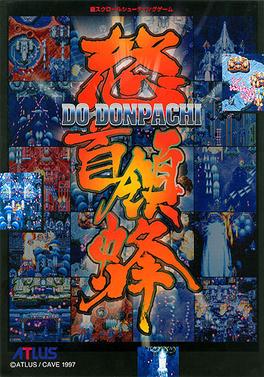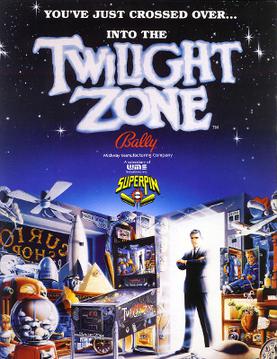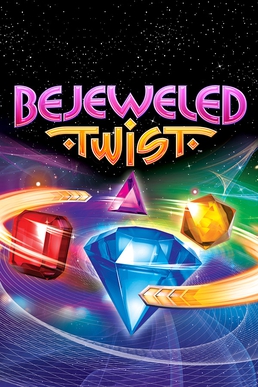
Bejeweled is a tile-matching puzzle video game by PopCap Games, developed initially for browsers in 2001. The first game developed by PopCap under their current name, Bejeweled involves lining up three or more multi-colored gems to clear them from the game board, with chain reactions potentially following.

DoDonPachi is a vertically-scrolling bullet hell shoot' em up developed by Cave and published by Atlus in 1997. It was the second game developed by Cave, and the sixth on Cave's first-generation arcade hardware. As with its predecessor DonPachi, the title is both a Japanese term for expressing the sound of gunfire, and a term that relates to bees. The sequel to this game is DoDonPachi II, which was made by a different developer. The original developer later released its own sequel, DoDonPachi DaiOuJou.
In video games, a combo is a set of actions performed in sequence, usually with strict timing limitations, that yield a significant benefit or advantage. The term originates from fighting games where it is based upon the concept of a striking combination. It has been since applied more generally to a wide variety of genres, such as puzzle games, shoot 'em ups, and sports games. Combos are commonly used as an essential gameplay element, but can also serve as a high score or attack power modifier, or simply as a way to exhibit a flamboyant playing style.
A glossary of terms, commonly used in discussing pinball machines.

Side Pocket is a pocket billiards simulation released as an arcade video game by Data East in 1986. It was ported to the Nintendo Entertainment System and Game Boy, while an enhanced remake was later released on the Sega Genesis, Super Nintendo Entertainment System, and Game Gear. The game spawned two sequels, as well as arcade spin-off series titled Pocket Gal.

Barker Bill's Trick Shooting is a light gun shooter video game developed and published by Nintendo for the Nintendo Entertainment System in 1990.

Zuma is a 2003 tile-matching puzzle video game developed by Oberon Media and published by PopCap Games. It was released for a number of platforms, including PDAs, mobile phones, and the iPod.

Chuzzle is a tile-matching puzzle video game developed by American studio Raptisoft Games and published by PopCap Games. The game involves connecting three or more fuzzballs named Chuzzles.

Star Trek: The Next Generation is a widebody pinball game, designed by Steve Ritchie and released in November 1993 by Williams Electronics. It was part of WMS' SuperPin series, and was based on the TV series. It is the only pinball machine that features three separate highscore-lists. Apart from the regular highscore-list and the buy-in-list, it also features a reminiscence to The Machine: Bride of Pin*Bot billionaires club. It is also the third pinball game overall based on the Star Trek franchise, following the 1979 pinball game by Bally, and the 1991 game by Data East, and preceding the 2013 pinball game by Stern.

Twilight Zone is a widebody pinball machine, designed by Pat Lawlor and based on the TV series of the same name. It was first released in 1993 by Midway. This game is part of WMS' SuperPin line of widebody games alongside Star Trek: The Next Generation and Indiana Jones: The Pinball Adventure.

Bookworm is a word-forming puzzle video game by PopCap Games. From a grid of available letters, players connect letters to form words. As words are formed, they are removed from the grid and the remaining letters collapse to fill the available space. Players earn more points by creating longer words or words which use less common letters and earn less for smaller words. In November 2006, PopCap Games released a sequel, Bookworm Adventures. Bookworm was released for the Nintendo DS digital distribution service DSiWare on November 30, 2009. It has also been released on the regular Nintendo DS cartridge.
Dynomite! is a PC game developed by Raptisoft Games and published by PopCap Games. Its gameplay is largely similar to that of the Puzzle Bobble series, but it has several unique differences.

Timber is an arcade game manufactured by Bally Midway in 1984. The goal is to amass points by chopping down trees, then logrolling in bonus rounds. Two players can compete simultaneously in the same play area. Timber was designed by Steve Meyer, who also designed Tapper, and both games have a similar audio/visual style.
Hammer Heads is an action arcade game similar to Whac-A-Mole. It is developed by Nuclide Games and distributed by PopCap Games.

Peggle is a casual puzzle video game developed by PopCap Games. Initially released for Microsoft Windows and Mac OS X systems in 2007, it has since had versions released for Xbox Live Arcade, PlayStation Network, the Nintendo DS, Windows Mobile, iOS, Zeebo, and Android; the game has also been ported as a Java application, and an extended minigame incorporated into the massively multiplayer online game World of Warcraft. A sequel was released in September 2008, titled Peggle Nights. PopCap, a subsidiary of Electronic Arts, announced Peggle 2 at E3 2013.

Bejeweled Twist is a tile-matching puzzle video game developed and published by PopCap Games. It is the third game overall and first spin-off game in the Bejeweled series, as well as being the first PopCap title to be released in high definition and feature widescreen support.

Zuma's Revenge! is a 2009 tile-matching puzzle video game developed and published by PopCap Games. It was released for Microsoft Windows and Mac OS X, as a sequel to the earlier 2003 video game, Zuma, and was later ported to Windows Phone.

View history

Tony Hawk's Pro Skater HD is a 2012 skateboarding video game in the Tony Hawk's series. Developed by Robomodo and published by Activision, Pro Skater HD is a high-definition remake of classic levels from Tony Hawk's Pro Skater, Pro Skater 2, and, via download, Pro Skater 3. It was released in 2012 for Xbox 360 through Xbox Live Arcade on July 18, for PlayStation 3 through PlayStation Network on August 28 and Steam on September 18. The game was delisted from Steam and all other digital marketplaces on July 17, 2017.

Luxor Evolved is a tile-matching video game originally released in 2012 by MumboJumbo. Luxor Evolved is a complete visual and gameplay refresh of the Luxor series, taking the previous titles' staple Ancient Egypt thematics and combining them with a retro video game aesthetic. The design philosophy is similar to that of the Pac-Man Championship Edition series, modifying the traditional match-three mechanics with an enhanced focus on both high-speed gameplay and arcade-style look and feel. Made for and first released on PC, it was quickly ported to iOS in an attempt to gain mobile marketshare. The game was later released for PlayStation 4, Xbox One, and Nintendo Switch in 2024. A port was also planned for Google Stadia, but was cancelled due to the service's discontinuation. This title is the last fully original game of the series.















